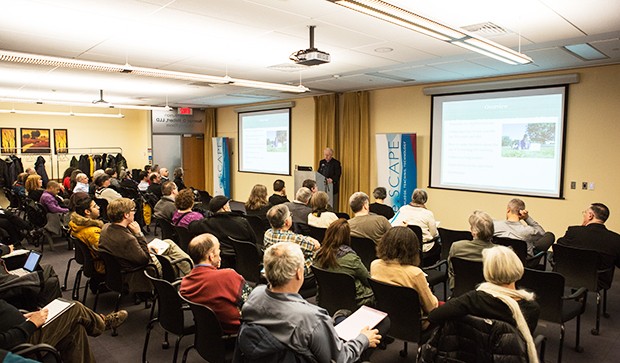Faculty share their passion for online learning
 Tony Bates delivers his keynote address: Designing University Teaching for a Digital Age. | Photo by Concordia University
Tony Bates delivers his keynote address: Designing University Teaching for a Digital Age. | Photo by Concordia University
“ELearning is here to stay,” declares Catherine Bolton, Concordia’s vice-provost of Teaching and Learning and one of the organizers Concordia’s e.SCAPE conference, held March 5 to 7.
From discussions of fully online programs and hybrid and blended learning, to a showcase of cutting-edge courses on offer, the second annual e.SCAPE conference had much food for thought for the more-than 200 faculty members who participated.
Speakers and participants shared best practices and experiences using eLearning.
Tony Bates, president and CEO of Tony Bates Associates Ltd. — a firm that has helped several Canadian schools develop eLearning strategies — kicked off the conference by presenting research findings by Seaman and Allen of the Babson Survey Research Group.
In a 2013 survey of 2,800 colleges and universities in the United States, enrolment in for-credit online courses grew five times faster than enrolment in traditional courses in the past 10 to 15 years, Bates reported. He added that there are more than 20 established quality-assurance standards to evaluate the quality of eLearning.
And what about Concordia?
“The educational world is clearly changing and Concordia is no different,” says Bolton. “Currently, about 13 per cent of our course registrations are for online courses, and we offer more than 50 courses.”
She adds: “Over the next five years, we foresee that more and more professors will be using digital tools in their classrooms, doing anything from ‘flipping’ their lectures into a recorded format to allow for more dedicated discussion and practice time in the classroom, incorporating meetings with students in classes at off-campus locations, and regularly employing different forms of social media to keep in touch with their students.”
The university’s commitment to online learning wasn’t news to the more-than a dozen faculty who led sessions on a variety of topics.
During Bates’s Q&A session, a number of faculty members spoke of the real and perceived challenges of adopting online learning. For some, online learning technology can pose challenges. Others noted that it could never replace face-to-face learning. Some questioned quality standards in eLearning.
The response from Bates was clear. Online learning is not meant to replace face-to-face teaching. Bolton agrees.
“University education exists on a continuum from fully face-to-face instruction to programs that are taught entirely online,” she says. “Concordia simply hopes to encourage faculty members and departments to think more strategically about the place of online learning in their programs.”
Flexibility, choice and convenience
ELearning is undoubtedly a growth area in post-secondary education, made possible by the pervasive use of technology by the student population.
Bates pointed to data that showed that by 2020, 50 per cent of all classes will be hybrid — blending face-to-face learning with online learning.
Why? Students want more flexibility, others don’t need the campus experience, others have to juggle school and work, and there are those who live in remote locations.
“Online learning will continue to play an important role at Concordia, offering students scheduling flexibility and unique learning opportunities,” says Saul Carliner, Concordia’s Provost Fellow for eLearning.
Carliner is also an associate professor in the Department of Education and program director of the PhD in Education. “Over the next five years, we will see additional online options for teaching and learning and leverage online tools in additional ways to enhance classroom learning and other aspects of the student experience at Concordia,” he says.
Concordia launched its first online course in 2000 with the assistance of eConcordia. Fourteen years later, the university remains a strong player in the world of eLearning.
View Tony Bates’ presentation (PDF).
View the Deborah-Dysart Gale & Casey Burkholder presentation (Prezi).